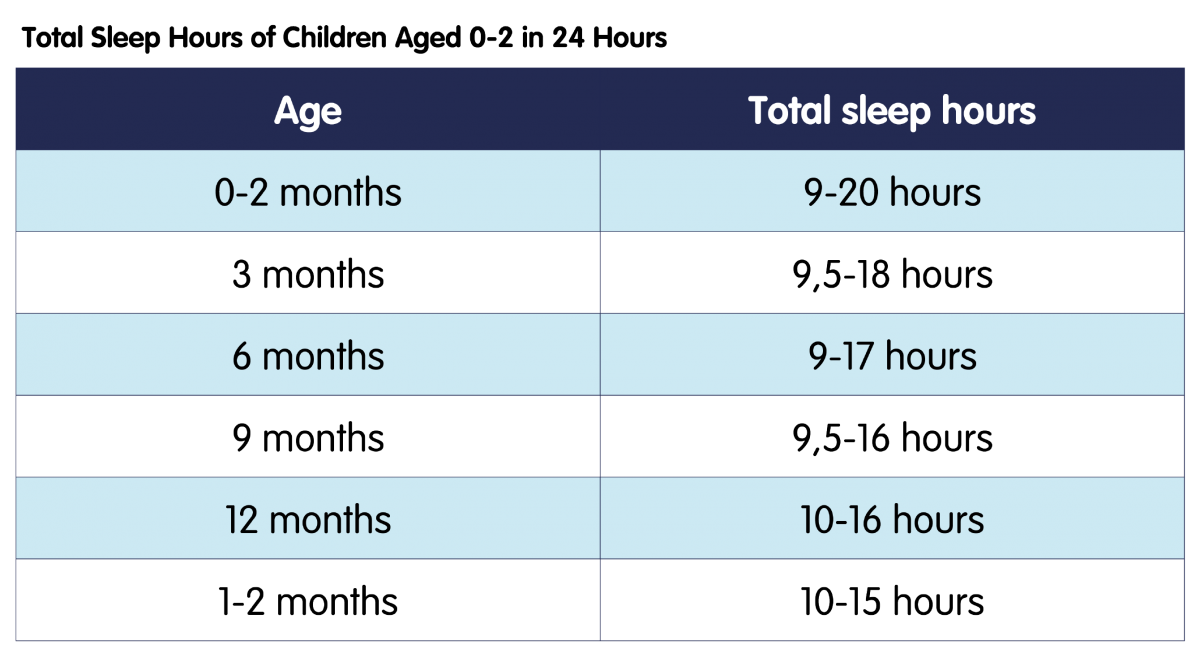Sleep is important for physiological and psychological functions such as growing, learning, and memory enhancement. That’s why it plays an important role, especially during early development, when physical and cognitive growth happens at an extraordinary rate.
Babies spend most of their first six months asleep. Newborns sleep for about 16 hours in each 24-hour cycle, which decreases to 14-15 hours at three months and 13-14 hours at six months.
Because newborns do not have an established circadian rhythm, their sleep is distributed throughout the day and night, and each sleep period is short due to the frequency of feeding. At around 10-12 weeks of age, the circadian rhythm begins to emerge and baby sleepiness gradually increases at night. Between the ages of 1-4, they continue to take daytime naps.
Nocturnal awakenings are common in infancy and early childhood. Night waking frequency is an important criterion by which parents evaluate the baby’s sleep quality. By the age of 5, daytime naps are over. Nocturnal sleep duration gradually decreases throughout childhood due to the transition to later bedtimes, and wake times generally remain constant throughout the routine week.

The longest sleep period can be 2-10 hours in 0-5 months, while it can be in the range of 3-13 hours for 6-24 months. While 0-2 month old babies can wake up to 4 times a night, this period decreases to 3 times between 3-11 months and 2 times between 1-2 years old. Frequent night awakenings with teething pains can be seen between 6-9 months.
Regarding environmental factors, more environment, light, air pollution and temperature related variables can negatively affect sleep duration in infants. In addition, parents night pre-sleep applications also allow they to benefit from sleep before going to bed. Language-based bedtime routines such as daily, singing, reading, and/or storytelling were founded to be positively experienced with better sleep outcomes in 0-5 month old infants.
In addition, both the type of food consumed and the hour it is consumed can affect sleep. There is evidence that certain nutrients, in particular, can affect sleep at the level of brain activity. For example fatty acids such as tryptophan, nucleotides and DHA can help to sleep and sleep patterns in infants. These components affect sleep at the level of brain activity. These foods can be preferred in the meals of babies through breast milk, thanks to the ingredients of formula during night feeding or during the complementary feeding phase, and the baby’s sleep can be provided more regular and better.
Resources:
- Barbara C. Galland A, Barry J. T. et al (2012), Normal sleep patterns in infants and children: A systematic review of observational studies. Sleep medicine reviews, 16(3), 213-222.
- Elaine S. B. (2021). What is “normal” infant sleep? Why we still do not know. Psychological reports, 124(2), 651-692.
- Schneider, N., Mutungi, G., & Cubero, J. (2018). Diet and nutrients in the modulation of infant sleep: A review of the literature. Nutritional neuroscience, 21(3), 151-161.


